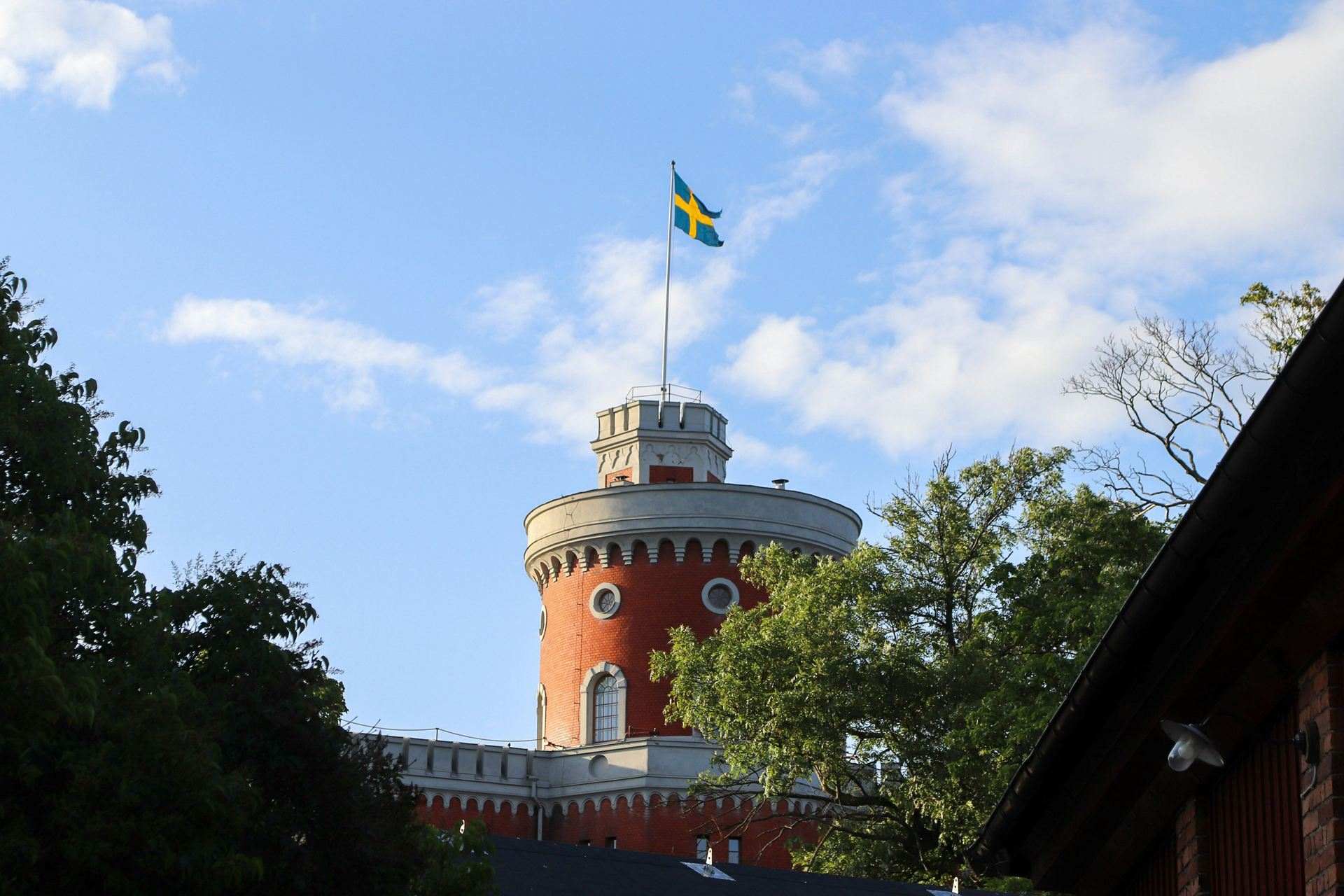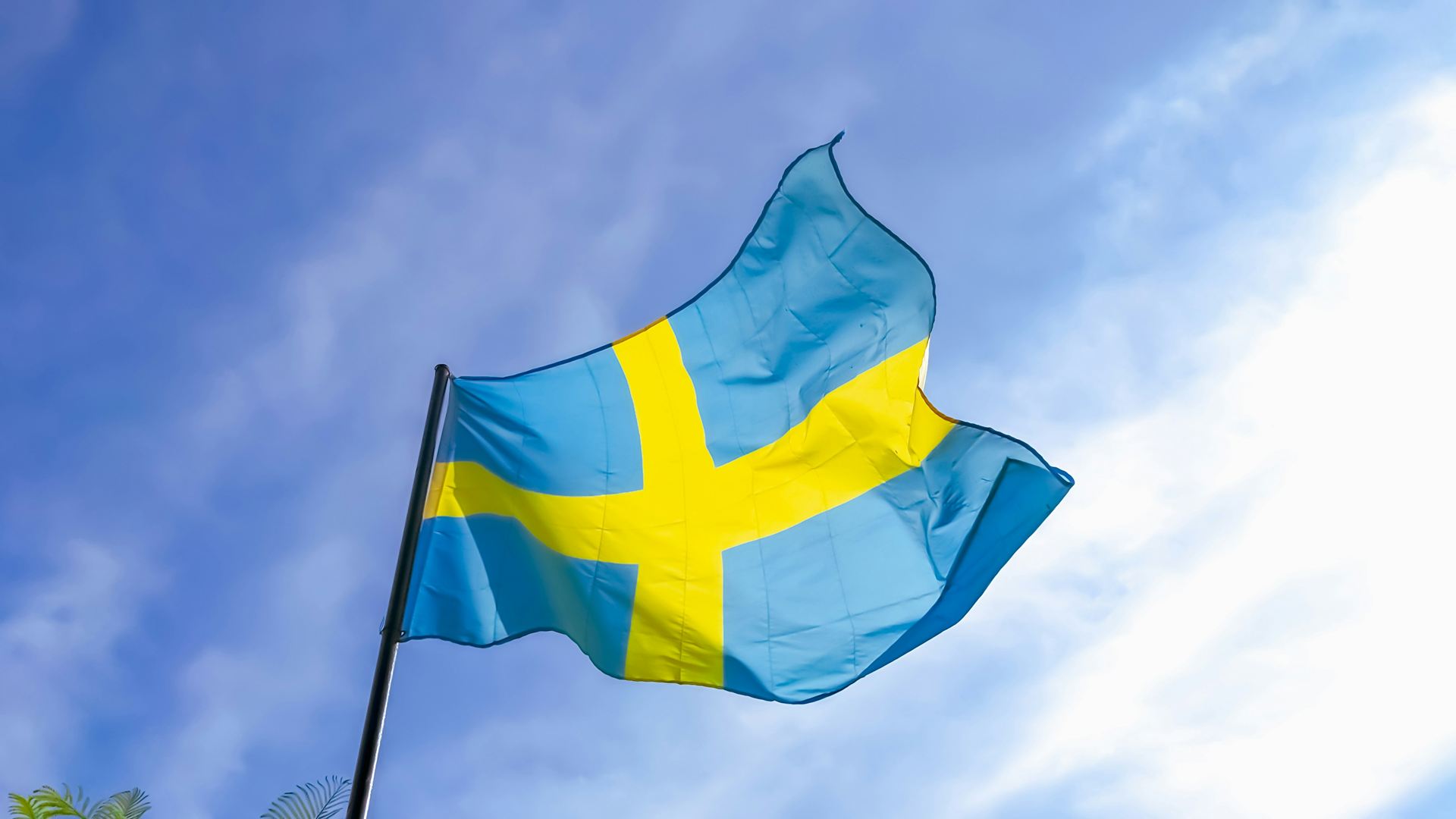Sweden has a strong reputation of having a high quality education system, emphasis on equality and child centred approach to learning. You are a parent who is relocating to Sweden, an international student or just a curious person who wants to know how education in the country is done, this guide will take you through the basics, preschool to adult education.
Overview of the Swedish Education System
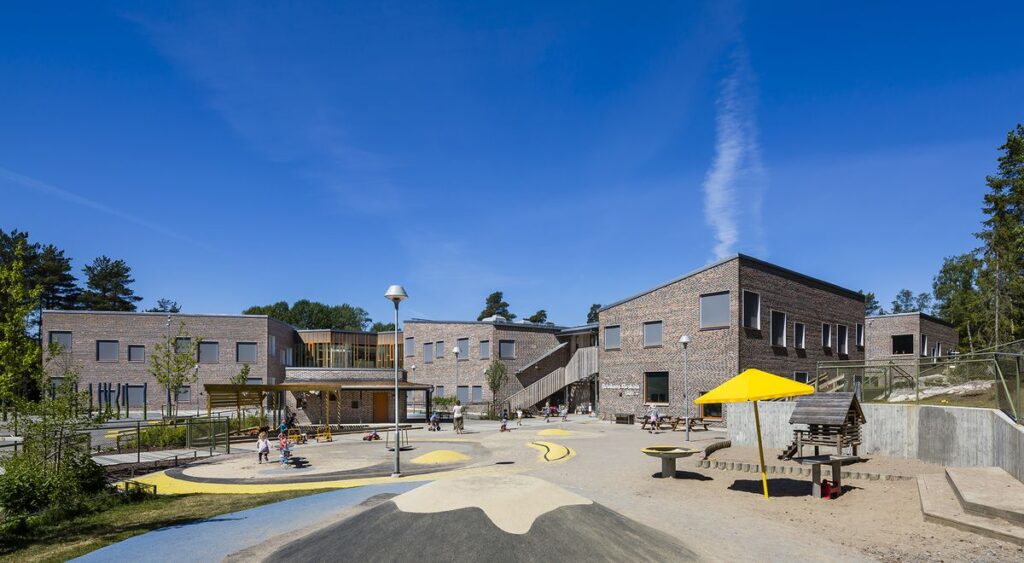
The Swedish system of schools is split into a number of stages:
- Förskola (Preschool) – ages 1–5
- Grundskola (Compulsory School) – ages 6–15 (10 years of mandatory education)
- Gymnasium (Upper Secondary School) – ages 16–19, optional but very common
- Vuxenutbildning (Adult Education) – admission to adults as a continuing education course, language course, or vocational training
The whole system is meant to be inclusive, non-discriminatory and open to every child, irrespective of their backgrounds. Taxes are the primary source of funding in schools, including school healthcare, school meals, and school welfare services.
Preschool (Förskola)
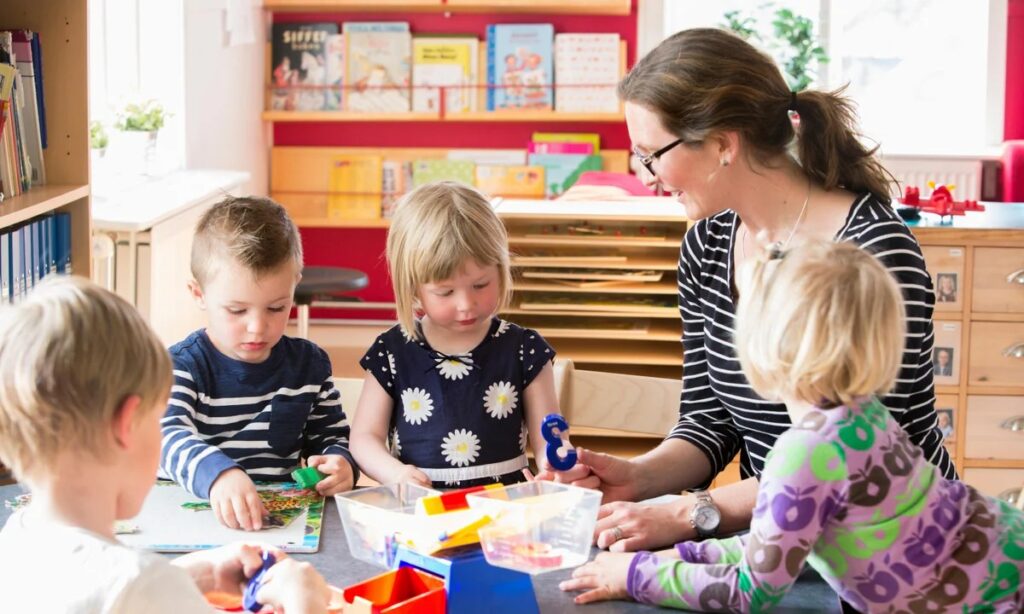
In Sweden, preschool is not just daycare. It presents children with organized learning and puts play at the frontline. Children between the ages of 1 and 5 have a right to preschool provided their guardians are employed, in school or even seeking employment.
- Application Process: Parents make an application at their local municipality (kommun). Three preschool options can usually be listed. Registration requires a Swedish personal number (personnummer) and a digital ID (e.g. BankID or Freja eID).
- Waiting List: The majority of preschools have queues. After registration, a place will be assured to your child within three months.
- Types of Preschools:
- Municipal Preschools: Run by the city.
- Independent Preschools: Privately run but follow the same curriculum.
- Pedagogical Care: Small groups in a caregiver’s home.
- Open Preschool: Free drop-in centers where parents stay with their children.
Read More: Learning Swedish for Beginners
Compulsory School (Grundskola)
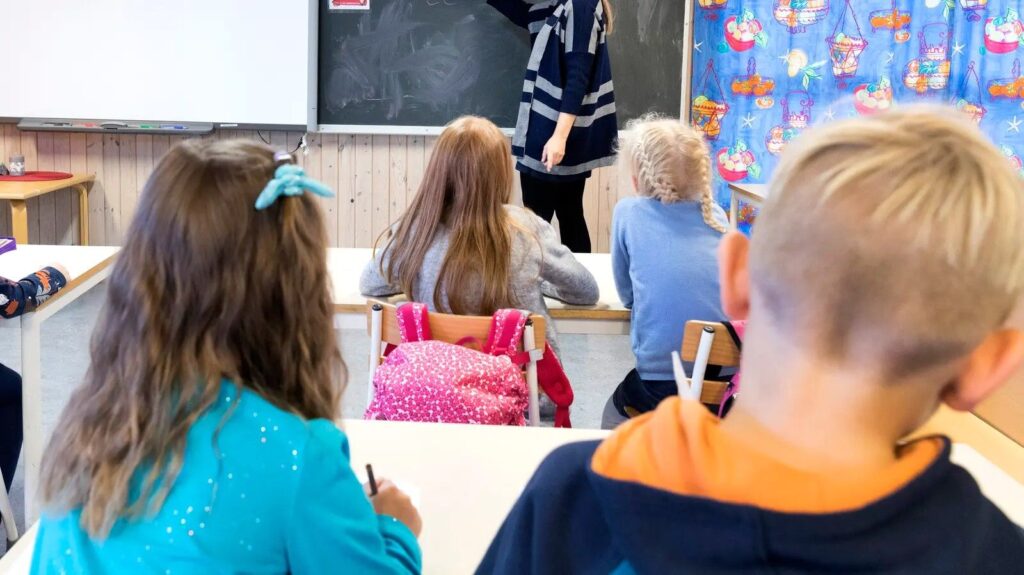
At the age of six, education becomes compulsory and continues to a period of ten years. Grundskola is separated into four stages:
- Förskoleklass (Year 0) – a preschool-school transition, and much play.
- Lågstadiet (Years 1–3) – early primary education.
- Mellanstadiet (Years 4–6) – middle stage that is more academic-oriented.
- Högstadiet (Years 7–9) – junior high, getting ready to upper secondary school.
Schools, both municipal and independent, can be selected by parents, and three preferred schools can be indicated in the applications.
All children receive:
- Learning materials and free textbooks.
- Free healthy school lunches everyday.
- Student medical services such as school nurses, doctors, psychologists and counselors.
Upper Secondary School (Gymnasium)
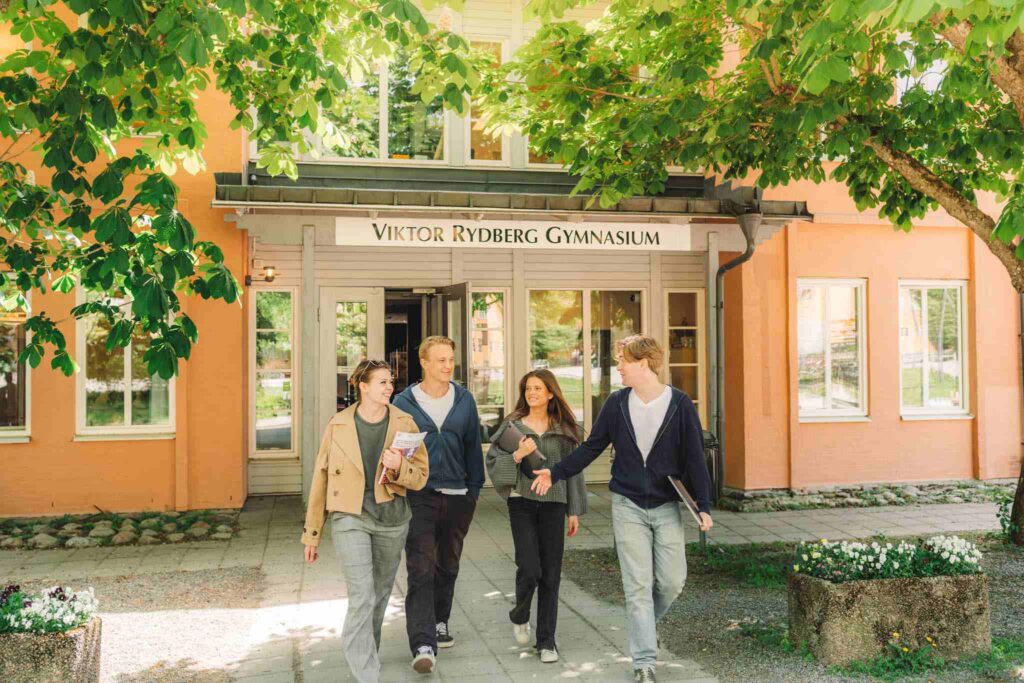
Most students go on to gymnasium after mandatory school. Though voluntary, more than 98 percent of Swedish students attend. Gymnasium is three years (Years 10-12) and has two major options:
- Higher Education Preparatory Programs – for those planning to enter university.
- Vocational Programs – for those aiming to enter the workforce directly.
It must pass in Swedish, English and mathematics to be admitted. Approximately, 85 percent of students in the ninth grade were eligible to continue their studies in 2023.
Rights of Students
The Swedish Education Act and Discrimination Act provide equal rights to all students. Children are not discriminated on the basis of gender, ethnicity, disability, or religion. Schools should also support children with special needs, and this way all students have an opportunity to excel.
Schools in Stockholm and Nearby Municipalities
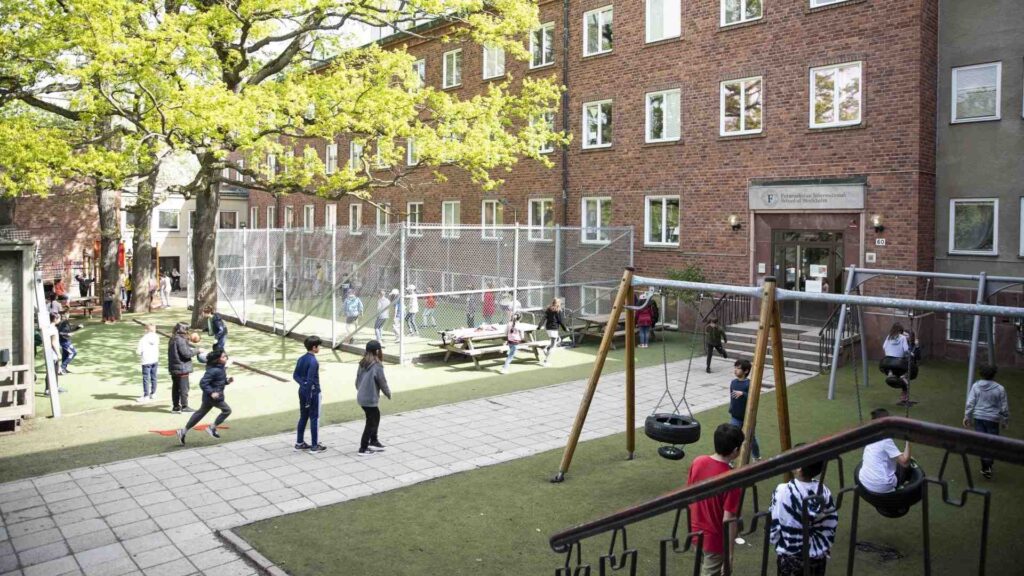
Even though every municipality surrounding Stockholm has its own preschool and school system, the fundamental Swedish model has stayed the same: ensured access, heavy focus on pedagogy, and continuity between preschool and adult education. Below are some examples:
1. Stockholm Kommun
- Preschool and Early Education: Stockholm has more than 1,000 preschools, 150 pedagogical care institutions (family daycare) and 50 open preschools. All children since the age of one have a right to a place, called platsgaranti (guaranteed place), within three months of application. Preschools are either municipal or independent and some are parent cooperatives. There are traditional preschool, pedagogical care at home of a caregiver, or open preschool (free drop-in with your child, no application is needed).
- Right to Preschool: It is open to children who are between 1 and 5 years of age provided that the guardians are either working, studying, on parental leave, or seeking employment. Children of even asylum seekers with some permits are allowed to attend. Children have the right to 15 hours/week since they are three years old irrespective of the parents working or not.
- Compulsory and Secondary Education: Every child is required to be in school ten years. Families have the option of municipal and independent schools. Gymsnasium (upper secondary schools) have a great variety of academic and vocational programs.
- Adult Education: Stockholm has SFI (Swedish for Immigrants), individual upper secondary and vocational / poly-technical training.
2. Stockholm Kommun
- Vision: The municipality is to become the best school municipality in Sweden, with the Skolresan strategy (The School Journey) in place, which is based on the principles of accessibility, digitalization, and sustainability.
- Preschool:There are approximately 70 preschools, municipal and independent. Preschool is based on the national curriculum, and the safety, high pedagogical quality, and engaging daily activities have clear goals. Parents can use the internet to compare preschools and the outcome of parent satisfaction surveys is available.
- Compulsory School: Sollentuna schools are focused on the welfare of students, their academic performance, and the quality of teaching. The three focus areas are:
- Accessibility: ensuring education for every child regardless of need,
- Digitalization: meaningful and engaging IT use in classrooms,
- Sustainability: promoting health, movement, and environmental responsibility.
- Gymnasium: The Greater Stockholm upper secondary region (Storstockholms gymnasieregion). Students are allowed to apply to any program within the region. There are also alternatives like Introduktionsprogram when one is not yet qualified to be on a national program, and anpassad gymnasieskola when one has intellectual disabilities.
- Adult Education: Kunskapsparken, which provides more than 50 vocational courses (many of which include internships), SFI and Komvux basic and upper secondary. Education can be flexible (classroom, distance or apprenticeship). Adults with special needs can receive guidance in studies and programs adapted to their needs.
3. Solna Stad
- Preschool: It offers municipal and independent preschools, pedagogical childcare and open preschools. Parents are able to compare institutions, apply online and see the results of annual surveys. It focuses on health promotion, safe environments and affordability.
- Compulsory School: Provides compulsory education which includes integrated fritidshem (after-school care), special needs, good student healthcare (elevhälsan), and mother-tongue instruction. Parents are able to compare schools and make applications online.
- Gymnasium: Solna contains its own upper secondary schools, two of which are Solna Gymnasium and an adapted upper secondary school. Under certain regulations, students can also study outside Solna or abroad. Such supports as travel cards (SL-kort), extended teaching, and healthcare services are offered.
- Adult Education and SFI: Solna Vuxenutbildning provides Komvux, vocational training and SFI (Swedish for Immigrants). Guidance services assist in applications, career guidance and adjusting the study paths to personal objectives. The Lärcentrum offers further learning assistance.
4. Huddinge Kommun
- Preschool and Childcare: Families may apply to places in preschools, family daycare, and leisure-time services of children 15 years old or younger.
- Compulsory School: Schools are focused on inclusive schooling and offer good elevhälsa (student health), such as the access to psychologists, nurses, social workers, and special educators.
- Upper Secondary: Huddinge has several gymnasiums (e.g. Huddingegymnasiet, Sjödalsgymnasiet, Widerströmska), most of which serve free breakfast and vegetarian dishes.
- Meals in School: The highlight of the school is the emphasis on healthy, sustainable, and environmentally friendly school meals in Huddinge. Preschools eat three meals a day (breakfast, lunch, afternoon snack), two vegetarian lunches a week. Menus are in accordance with Livsmedelsverket (National Food Agency). Nuts and sesame products are also forbidden as they are allergic. Schools also claim EU milk subsidies.
- Adult Education: Vux Huddinge provides Komvux, vocational training and SFI. Mentoring is offered both face-to-face and online and as of August 2025 the course applications will be changed to subject-level applications with the new GY25 reform.
- Sustainability: Schools are proactive in minimizing food waste, expanding organic food, and enhancing sustainable growth in accordance with the municipal environmental objectives.
Also See: How to Book a Skatteverket Online Appointment for Personnummer and ID Kort
Adult Education and SFI
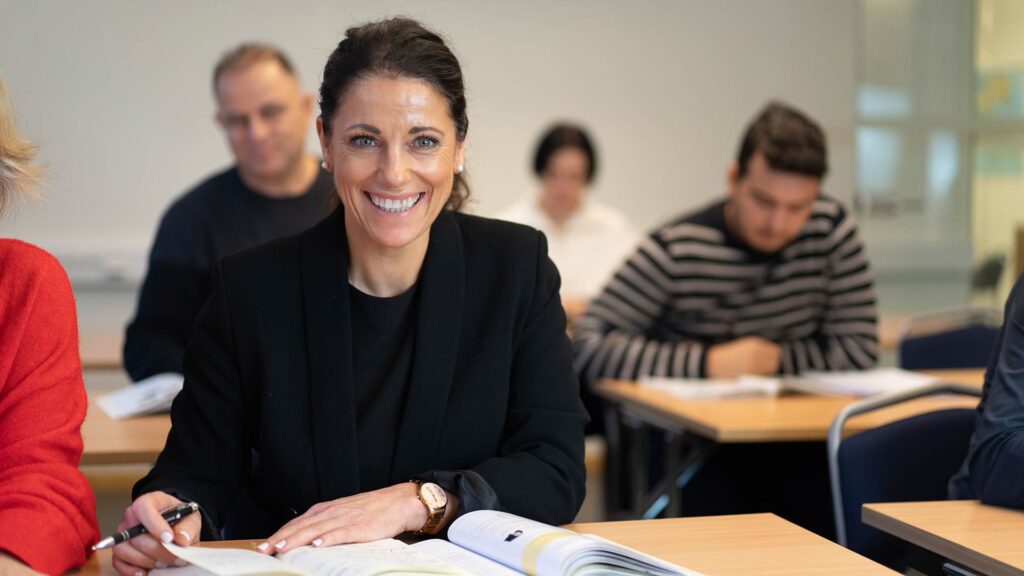
Children are not the only ones to be educated in Sweden. Adults can access Komvux (municipal adult education), and in this case they can:
- Pure incomplete secondary education.
- Attend professional education.
- Learn SFI (Swedish for Immigrants) so as to become a part of Swedish society.
- Get ready to study or switch occupation.
These programs are usually free or highly subsidized and can be offered on-site and online.
Practical Notes for Parents
Although in Sweden education is usually free and accessible, there are some details that should be remembered by the family:
- Free education: Education at all levels beyond primary level is completely free. All one needs is a personnummer (Swedish personal identity number) which is used as the key to registration.
- Preschool fees: Förskola (preschool/kindergarten) is not completely free. A small monthly fee is generally paid by parents, which is often about 1,000 SEK, depending on income, and the government pays the rest. Since compulsory school (grundskola), education is completely free.
- State schools flexibility: It may be particularly useful when newcomers choose a municipal (state-run) school. Many municipal schools will accept the child to begin attending even though the personal number is pending even though his or her personnummer has not yet been issued.
These are practical considerations that help the families to cope with the Swedish system more easily and the children can start their education journey without any problems even when paperwork is still in progress.
The education system in Sweden is founded on equality, accessibility and lifelong learning. Since preschool to adult education, each level is aimed to help not only in academic achievement but also in social and emotional health. Sweden offers one of the most inclusive education models in the world with free school meals, healthcare and a high emphasis on child rights.
In case you are going to Sweden with children, it is better to enroll children in preschool or school as early as possible with your local municipality. Proper preparation will mean your child will access a system of education that is always rated as one of the best in the world.

